Tensions Ease On Spain-Morocco Border But Migrant Row Rankles
The seas were calm along the Moroccan-Spanish frontier late Wednesday with no sign of swimmers trying to reach Spain's north African Ceuta enclave after a record 8,000 arrivals in just one day.
Spanish authorities were caught by surprise when large numbers of people began flooding across the frontier on Monday as the Moroccan border forces looked the other way, quickly leaving the tiny territory overwhelmed.
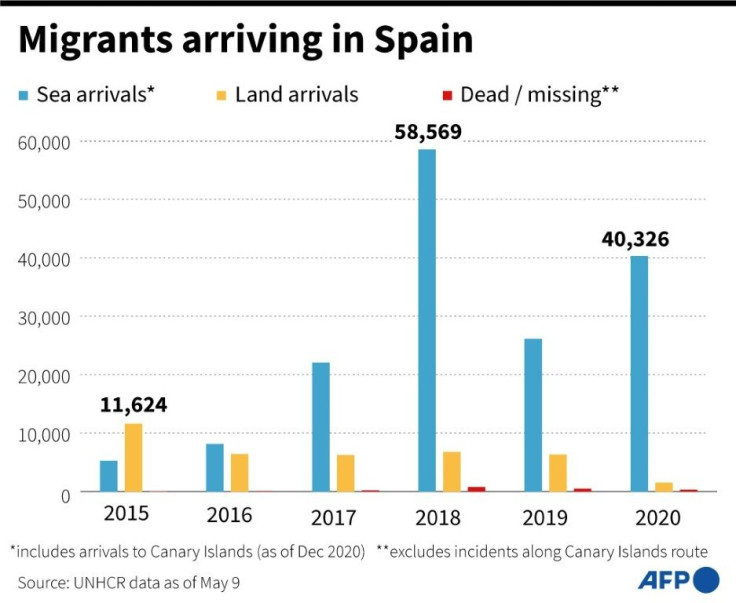
Vowing to "restore order" along its borders, Spain quickly bolstered security measures, sending in troops and police reinforcements who were deployed along the frontier.
It has also been sending the arrivals home, with the Spanish government delegation in Ceuta giving an updated figure of 5,600.
But although the influx has slowed, it has not stopped with several hundreds more trying to make the trip on Wednesday, AFP correspondents at the scene said.
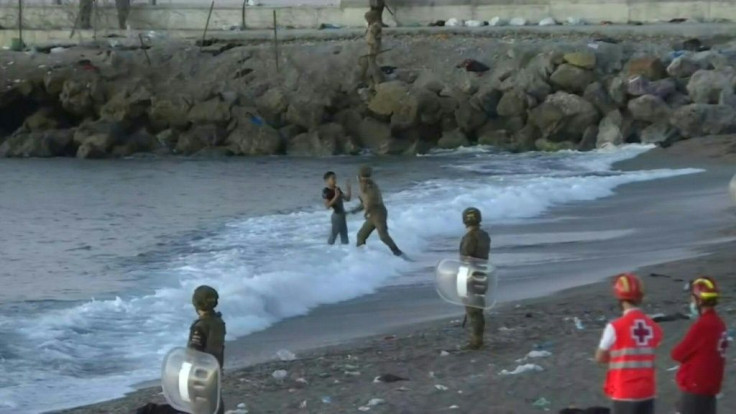
The influx has hiked existing tensions between Spain and Morocco, with Prime Minister Pedro Sanchez on Wednesday accusing Rabat of "disrespect" over the crisis.
The spat comes with Spain and Morocco at loggerheads over Madrid's decision to provide medical treatment for the ailing leader of the Western Sahara independence movement who has Covid-19.
By mid-evening, there was no sign of any more people in the sea and the numbers of soldiers on the beach were noticeably fewer, AFP correspondents said.
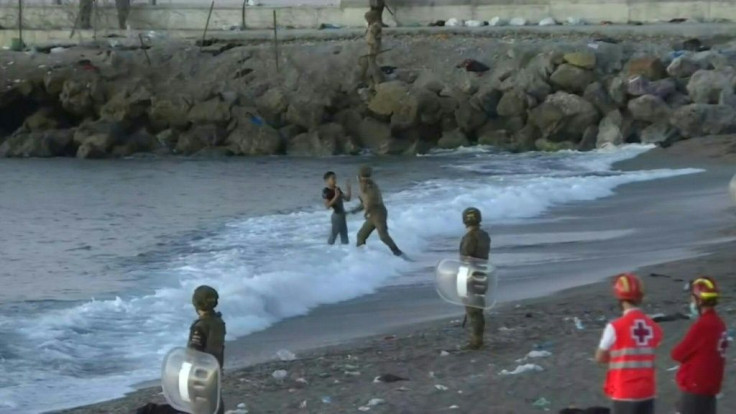
Meanwhile at a huge warehouse complex close to the border, a handful of Red Cross medics wearing full protective gear could be seen carrying out Covid tests on scores of minors at a long trestle table outside.
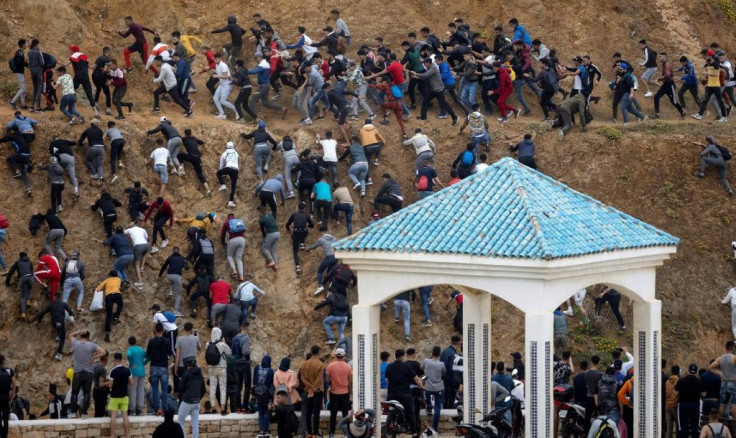
Once tested, the youngsters, some wrapped in red blankets, sat down outside in long lines, munching sandwiches and apples, many of them larking around.
A few appeared to be very young, under the age of 10.
As darkness fell, several dozen young girls could be seen climbing into buses which drove them to one of two centres set up to host minors.
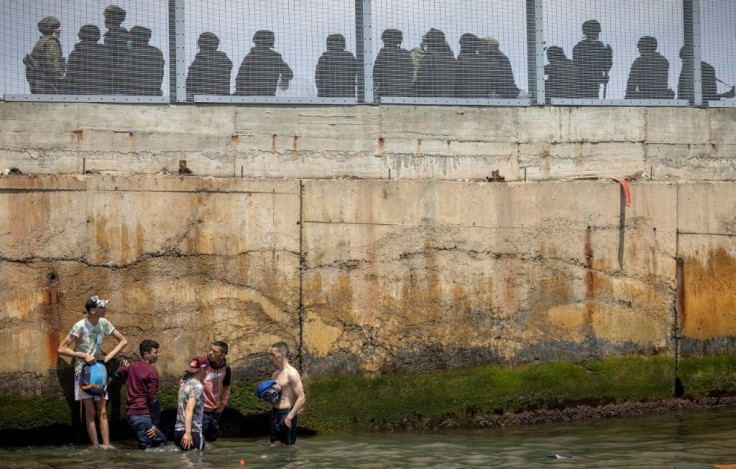
During the day, hundreds had massed on the Moroccan side of the border in the hope of crossing, with Spanish security forces firing tear gas cannisters to distance the crowd as their Moroccan counterparts sought to prevent people from entering the water.
The crowd eventually dispersed, returning to the nearby border town of Fnideq.
Many said they had been forced to leave by the desperate living conditions in Morocco.
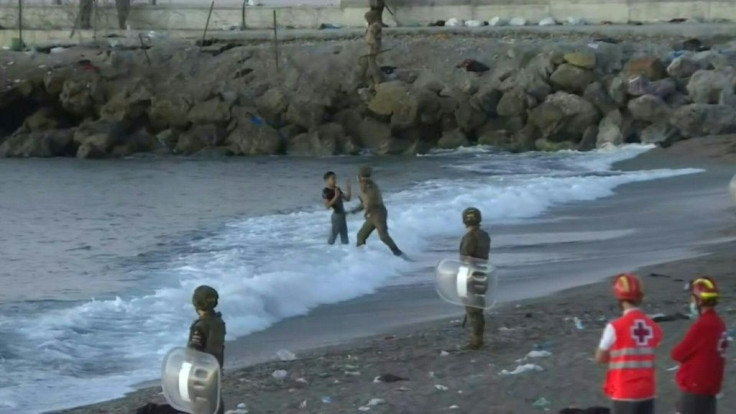
"You have a family and you have seven euros to feed eight people, what do you do?" asked 34-year-old Mohammed Tribak who swam over on Monday.
Analysts said it was clear Morocco had turned a blind eye to the human tide entering Ceuta in order to put diplomatic pressure on Spain to recognise its sovereignty over Western Sahara.
But the matter has also revived tensions over migration, with European Commission vice president Margaritis Schinas warning Wednesday that Europe "won't let itself be intimidated by anyone on the issue of migration" in an allusion to Morocco.
The record arrivals also prompted fighting talk from Sanchez.
"This is an act of defiance," he told parliament, a day after visiting Ceuta, describing the events as "a lack of respect not only towards Spain, but also towards the entire EU".
Meanwhile, Amnesty International lashed out at both nations over the crisis.
"Asylum-seekers and migrants are being used as pawns in a political game between Morocco and Spain," the London-based rights watchdog charged, saying "about 2,000 unaccompanied children" were among the arrivals.
Accusing Spanish forces of using violence against those who crossed the frontier, it also pointed the finger at Morocco for waving them through in a tit-for-tat response over Western Sahara.
"Spain must know the price for discrediting Morocco is steep," Morocco's human rights minister Mustapha Ramid wrote on Facebook on Wednesday, in remarks pounced on by Amnesty.
"It appears from a Facebook post by Morocco's Minister for Human Rights that this selective border enforcement was retaliation," Amnesty's Virginia Alvarez said.
"Morocco is playing with people's lives. They must not use people, among them its own citizens, as pawns in a political game."
© Copyright AFP 2024. All rights reserved.




















